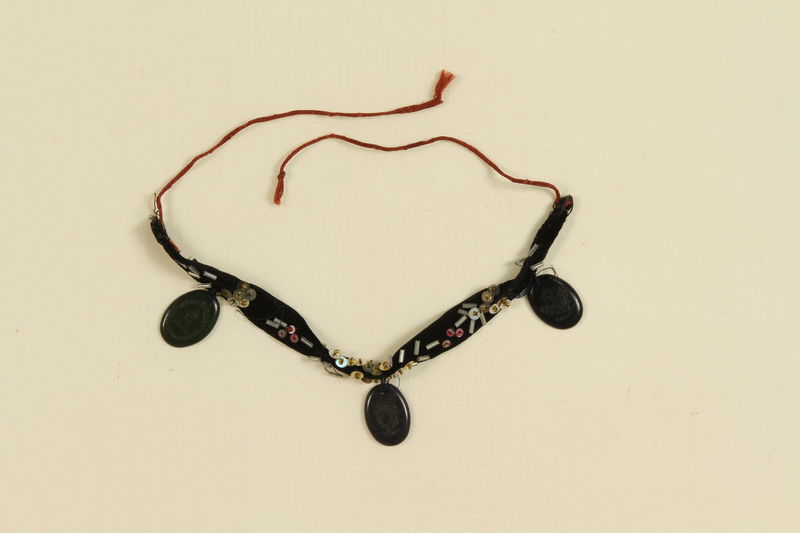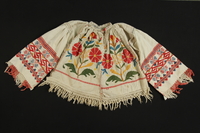Overview
- Brief Narrative
- This item was with Lucia Cioaba during 1942-1945. The necklace is a typical accessory worn by an unmarried Romanian Romani girl.
- Date
-
use:
1942-1945
- Credit Line
- United States Holocaust Memorial Museum Collection
Physical Details
- Classification
-
Jewelry
- Category
-
Necklaces
- Object Type
-
Necklaces (lcsh)
Rights & Restrictions
- Conditions on Access
- No restrictions on access
- Conditions on Use
- No restrictions on use
Administrative Notes
- Legal Status
- Permanent Collection
- Provenance
- The necklace was acquired by the United States Holocaust Memorial Museum in 1989.
- Record last modified:
- 2024-02-27 14:40:43
- This page:
- https://collections.ushmm.org/search/catalog/irn1159
Download & Licensing
In-Person Research
- By Appointment
- Request 21 Days in Advance of Visit
- Plan a Research Visit
- Request to See This Object
Contact Us
Also in Romanian Roma collection
The collection consists of items used by Romanian Roma.
Date: 1942-1945
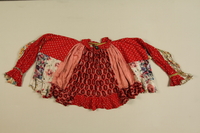
Red shirt worn by a Romanian Romani
Object
The shirt was made in Felias and worn on special occasions by Gheorge Cioaba, between the years 1942-45.
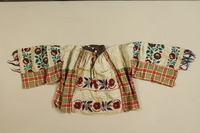
Multiprint shirt worn by a Romanian Romani
Object
The shirt was made in Felias and worn on special occasions by Gheorge Cioaba, between the years 1942-45. [Ref 1]
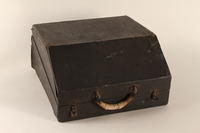
Accordian which belonged to a Romanian Romani
Object
Accordian which belonged to Gheorge Cioba, a Romanian Romani, from 1942-1945. This accordian stayed with Gheorge Cioaba from 1942-1945.
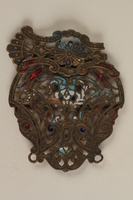
Brooch worn by a Romanian Romani man
Object
Traditionally worn on the vest, this brooch is a symbol of power of the Bulibasha, the chief of Calderai, a Romanian nomadic Roma group.

Headband (Sihon) worn by a Romanian Romani woman
Object
This item was with Lucia Cioaba during 1942-1945. The headband is a typical accessory for unmarried Romanian Romani girls. Married women wore scarves.
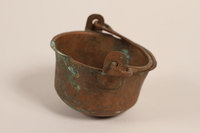
Small pot used by a Romanian Romani as an advertisement for larger pots
Object
Belonged to Toma Racloro, a Romanian Romani. When he was deported from Baranesti (near Slatina) to Transnistria in 1942, he left some cookware with a Romanian peasant. Toma died; after 1945, his wife got the pots back from the peasant.
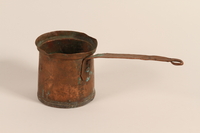
Pot used by a Romanian Roma
Object
Belonged to Toma Racloro, a Romanian Roma. When he was deported from Baranesti (near Slatina) to Transnistria in 1942, he left some cookware with a Romanian peasant. Toma died; after 1945, his wife got the pots back from the peasant.
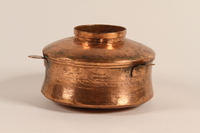
Large pot used by a Romanian Romani as a distilling device for making peasant brandy
Object
Belonged to Toma Racloro, a Romanian Romani. When he was deported from Baranesti (near Slatina) to Transnistria in 1942, he left some cookware with a Romanian peasant. Toma died; after 1945, his wife got the pots back from the peasant. This pot was used as a distilling device to make, tuca, a prune brandy.

